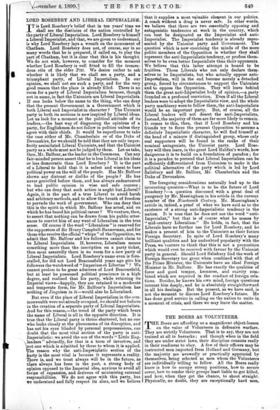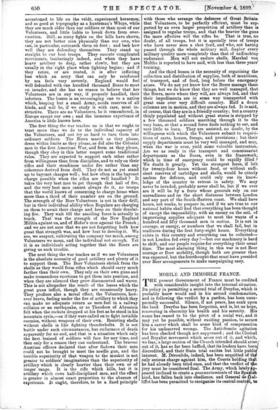THE BOERS AS VOLUNTEERS. T HE Boers are affording us a
magnificent object-lesson on the value of Volunteers in defensive warfare. They are strictly Volunteers. That is to say, they are not trained at all in barracks ; and though when in the field they are under strict laws, their discipline consists really in their readiness to obey. A few of their officers may be instructed men imported from Holland and Germany, but the majority are avowedly or practically appointed by themselves, being selected as men whom the Volunteers are individually willing to follow. All the Boers really know is how to occupy strong positions, how to secure cover, how to render their groups least liable to get killed, and how, when they get the chance, to shoot straight. Physically, no doubt, they are exceptionally hard men, accustomed to life on the veldt, experienced horsemen, and as good at topography as a huntsman's Whips, while they are much older than our soldiers or than most of our Volunteers, and little liable to break down from over- exertion. Still, as many fights on the hills have shown, they are not better men physically than our own, who can, in particular, outmarch them on foot ; and look how well they are defending themselves. They stand up straight to our best troops. They execute complicated movements, lumberingly indeed, and when they have heavy artillery to drag, rather slowly, but they are usually in the right place when fighting begins ; and if they retire, or are routed, it is after inflicting loss which an army that can only be reinforced by sea feels very severely. England would feel well defended with one hundred thousand Boers to meet an invader, and she has no reason to believe that her Volunteers are in any way, if properly handled, their inferiors. The lesson is an encouraging one to a nation which, keeping but a small Army, needs reserves of all kinds, and will be, if we study it with care, most in- structive. There are no Volunteers, be it remembered, in Europe except our own ; and the immense experience of America is little known here.
The first thing the war teaches us is that we ought to trust more than we do to the individual capacity of the Volunteers, and not try so hard to turn them into ordinary soldiers. The Boers march as they please, dress within limits as they please, as did also the Colonial men in the first American War, and form as they please, though they obey in this latter respect some traditional rules. They are expected to support each other rather from willingness than from discipline, and to rely on their rifles and their steadiness under fire rather than any coherence derived from drill. They do not as yet stand up to bayonet charges well ; but how often is the bayonet charge possible when the rifles are well handled ? It takes the very beat men to get through that hail of fire, and the very best men cannot always do it, no troops that the world knows of consenting to charge home when more than a third of their number are on the ground. The strength of the Boer Volunteers is not in their drill, but in their individual ability when Regulars are charging on them to await their charge and keep on their desolat- ing fire. They wait till the assailing force is actually in touch. That was the strength of the New England Militia against us, and of Hofer's men against the French ; and we are not sure that we are not forgetting both how great that strength was, and how best to develop it. We are, we suspect, cultivating the company too much, among Volunteers we mean, and the individual not enough. Yet it is as individuals acting together that the Boers are giving us such trouble.
The next thing the war teaches us if we use Volunteers is the absolute necessity of good artillery and plenty of it to support them. The Boer Volunteers shrink from the shells as they would from rifles which should carry much farther than their own. They rely on their own guns and make tremendous exertions to get them into position, and when they are silenced they grow disconcerted and waver. This is not altogether the result of the losses which the great guns inflict, though they are occasionally heavy. They produce also a moral effect, the Volunteers, how- ever brave, feeling under the fire of artillery to which they can make no adequate return as men feel in a railway collision or an earthquake, or as Theodore of Abyssinia felt when the rockets dropped at his feet as he stood in his mountain eyrie,—as if they were called on to fight invisible enemies, without weapons of their own. Resisting shells without shells is like fighting thunderbolts. It is not battle under such circumstances, but endurance of death apparently for no end, and that is a situation which only the best trained of soldiers will face for any time, and then only for a reason they can understand. The bravest Austrian officers declared that after Sadowa their men could not be brought to meet the needle gun, and the terrible superiority of that weapon to the musket is not greater to soldiers' imaginations than the superiority of artillery which is clearly heavier than their own or of longer range. It is the rifle which kills, but it is artillery which cows half-disciplined men, and the effect is greater in almost exact proportion to the absence of experience. It ought, therefore, to be a fixed principle with those who arrange the defences of Great Britain that Volunteers, to be perfectly efficient, must be sup. ported by an even larger proportion of artillery than is assigned to regular troops, and that the heavier the guns the more effective will the rifles be. That is true, no doubt, of all troops, but it is specially true of troops who have never seen a shot fired, and who, not having passed through the whole military mill, display every military quality more completely than that of unflinching endurance. Men will not endure shells, Marshal von Moltke is reported to have said, with less than three years' training.
And the third lesson is the necessity of organising the collection and distribution of supplies, both of munitions, of transport, and of food, long before the emergency arises. We do not yet know how the Boers manage these things, but we do know that they are well managed, that the Boers, move where they will, are always fed, and that their impedimenta are in some way transported with great ease over very difficult country. Half a dozen columns are in motion, and they are always fed. It is said, of course, that they are in a friendly country; but a country thinly populated and without great stores is stripped by a few thousand soldiers marching through it to the very bone, so that a second force finds nothing to eat, and very little to burn. They are assisted, no doubt., by the willingness with which the Volunteers submit to requisi- tions of carts, horses, forage, and provisions ; but their supply departments must be very well managed, and may, when the war is over, yield some valuable instruction.
Are we as ready in the transport and commissariat departments as the Boers, even in the framework, which in time of emergency could be rapidly filled ?
We doubt it greatly. Yet the strongest force, if left for twenty-four hours without food, or without suffi- cient reserves of cartridges and shells, would be utterly useless for defence, and could only use its know- ledge of the country to retreat in safety. We may never be invaded, probably never shall be, but if we ever are it will be by a force whose generals rely on our unreadiness and on the short distances between London and any part of the South-Eastern coast. We shall have hours, not weeks, to prepare in, and if we are true to our national habits shall find that everything has been thought of except the impossibility, with an enemy on the soil, of improvising supplies adequate to meet the wants of a hundred and fifty thousand men in motion. It is not in courage, or energy, or numbers that we shall fail, but in readiness during the first forty-eight hours. Everything exists in this country and everything can be collected— is not London fed every day ?—but our machinery is hard to shift, and our people require for everything their usual time. The most alarming thing in this war is not Boer courage or Boer mobility, though both are greater than was expected, but the forethought that must have presided over Boer arrangements to make campaigning easy.























































 Previous page
Previous page